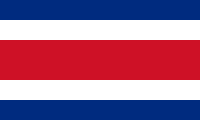Country code:
Flag:

Ownership rules:
Default (statutory) regime for the ownership | |
|---|---|
Default (statutory) regime for employee’s creations | Employer, unless otherwise agreed (provisions of the Labour Code). |
Ownership of research results in publicly sponsored research | Each entity is determined in its call and distribution of funds, usually in partnership with higher education institutions. |
Specific ownership rules for public HEIs/research organisations and possibility to modify it contractually | Basically, in Costa Rica each HEI has autonomy to regulate this issue on its own. |
Specific ownership regime for students/ visiting researchers/doctoral students and possibility to modify it contractually | Each HEI regulates this issue on its own. For example, Costa Rica Institute of Technology (TEC): ownership of intellectual property over a student work (practice-thesis courses) belongs to the student, except inscription on the Vice Presidency of Research and Extension or special contractual relationship. Researchers and authors get 50% of the profits. The TEC reserves the right heritage of the result. |
Related law (name & link) | There is no specific standard, and each HEI internally regulates such matters. For example Costa Rica Institute of Technology (TEC) has specific rules that can be viewed at: (link) |
Dissemination rules:
Limitations on publication | Only such that might be imposed on a project by internal HEI standards. |
|---|---|
Specific rules regarding publication of scientific results financed by public bodies | Each call is established. |
Non-disclosure clauses in research contracts | Each project determines the clause should govern. |
Specific incentives for innovation activities:
Related Law (name & Link) | Law to Promote Scientific and Technological Development of 1990 |
|---|---|
Incentives provided by law for individual researchers | Legislation does not distinguish between individual and group research. Distribution is made according to participation or leadership in the project. |
Related Law (name & Link) | Law to Promote Scientific and Technological Development of 1990 |
Incentives provided by HEI for researcher | Each HEI may provide incentives on its own. For example, University of Costa Rica: Guidelines for Linking paid the University of Costa Rica With The External Sector. |
Form of commercialisation:
Form of commercialisation | Requirements regarding form of contract | Limitations for HEIs | HEIs Unit responsible for commercialisation | Related law (name & link) |
|---|---|---|---|---|
In each case depends on needs and performance of the project. | In each case depends on needs and performance of the project. | There is no single form for exploitation, each HEI has several limitations, according to its size, structure and number of researchers and scaling possibilities. | For example: Costa Rica Institute of Technology - Linkage Center and University-Industry and Transfer Center Continuing Education; Universidad de Costa Rica: Each academic unit. | Each HEI has its own internal regulations. For example: Universidad de Costa Rica - Guidelines for Linking paid the University of Costa Rica |
Revenue sharing:
Remuneration/ Participation in revenues | Statutory rules regarding remuneration | Statutory rules regarding revenue sharing | Internal HEIs rules regarding revenue sharing | Related law (name & link) |
|---|---|---|---|---|
According to agreement between the two parties. | There is no single standard. | There is no single standard. | Each HEI has its own rule. For example, Costa Rica Institute of Technology (TEC) maintains regulation whereby researchers and authors get 50% of the profits. The TEC reserves the right to another 50% of the profits. | Not available |
Models of contracts used in R&D:
Type of contracts | Short description | Source (link) |
|---|---|---|
There is no single model developed for the country, each HEI provides the most appropriate according to the needs and source of project funds. Similarly each entity develops documents regarding allocated funds. Sometimes project counterpart already has a defined model contract and the HEI must translate (if necessary) and negotiate some points. |

